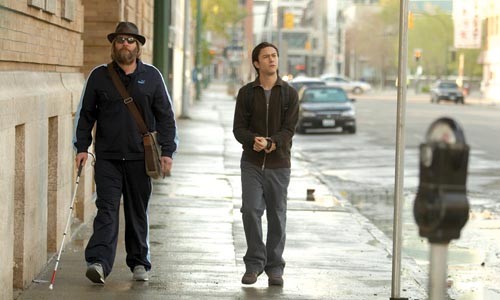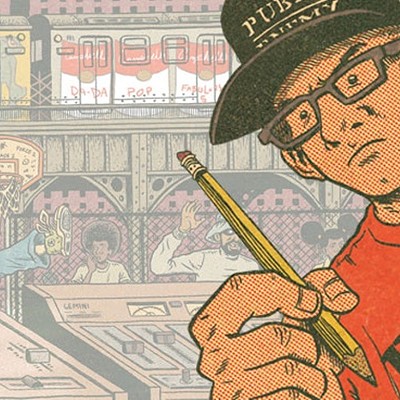Chris Pratt lost his life the day he killed two of his friends.
He wanted to show them the fireflies. So he took them -- his girlfriend and another couple -- for a midnight drive down a deserted Kansas farmland road, and he turned off his headlights to accentuate the enveloping glow of the insect mating ritual. The collision with the stalled combine that he didn't see up ahead left his body intact but his brain a tangled mess.
Now Chris (Joseph Gordon-Levitt) has to write everything down, and sometimes he says just what's on his mind, even if it's inappropriate. He works as a night janitor at a bank, where he's memorized the teller's creed, hoping against all hope for a promotion. His sanguine roommate, Lewis (Jeff Daniels), a blind man whom he met at the rehab facility, tries to teach him self-sufficiency. But his wealthy father gives him just enough money to keep him under control.
This would be enough for a small character study, and for half of writer/director Scott Frank's The Lookout, it is. Until it all falls apart in the last reel, The Lookout is a beautifully plaintive drama, filled with winnowing sadness, and gently performed by Gordon-Levitt, an appealing young actor who makes you want to put your arm around his shoulder to reassure him.
But then Chris meets Gary (Matthew Goode), a smooth-talking ersatz Robin Hood with a plan to rob Chris' small-town bank filled with money legally stolen from underpaid farmers by greedy agri-business. He seduces Chris by giving him confidence and getting him laid, and then he asks him to be the lookout. "Whoever has the money has the power," says Gary, who's asthmatic (everyone in The Lookout is damaged). When Chris' dad turns him down for a loan, he signs on.
Even this twist might have worked, if Frank knew what to do with it. But we certainly didn't need another bloody-heist climax, and in the last reel of his film, he undermines himself over and over. Before that happens, Frank works things through palpably and with unpretentious insight about loss and recovery, family and interdependence. The Lookout reminded me for a while of Half Nelson, a better movie about a troubled loner that knew how to keep it real.
Lewis helps Chris remember things by telling him to focus on his ending so he'll know where his stories are headed. It's an interesting idea, but surely Frank didn't concoct his robbery yarn first and then just fill in the rest. When you don't have short-term memory loss, there's another strategy for telling stories: Begin with a human premise, as Scott does, and then let it evolve into something resembling real life. That's the part of the job that The Lookout doesn't quite pull off. 














